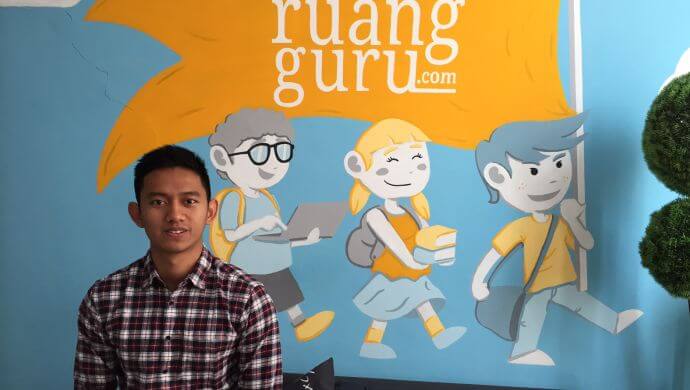Ruangguru CEO Adamas Belva Syah Devara reveals the edtech firm’s game plan for 2016 — and how his education is playing a role in it

As one of the co-founders of Indonesian edtech startup Ruangguru, Adamas Belva Syah Devara, during the initial years, ran the team remotely from the US, where he was pursuing his Post Graduate degree.
“It’s difficult,” he admits, as he welcomed e27 into his room at Ruangguru’s new headquarters in Tebet, South Jakarta.
“Clear communication is key … It [also] requires a lot of support from your co-founder,” he adds. He was referring to Ruangguru’s Co-founder Iman Usman whom he dubbed as his best friend.
After running the business via email and WhatsApp, this year Devara returned to Jakarta after finishing his education. He was then appointed as the new CEO while Usman became Chief Products and Partnership Officer.
“We had a conversation with Iman and we thought it’s good to have a new perspective as the head of Ruangguru, and we want to be really focussed on products,” he explains.
This move is crucial as user acquisition is the company’s big agenda for 2016. Having secured 150,000 users plus parents and a community of 300,000 people, the company hopes to grow the number to one million by end of year.
Starting with an online marketplace for private tutors, Ruangguru has branched out into providing a learning management system (LMS) platform that allows teachers to create content and assign school works on the platform for students to work on, an exam practice feature on their desktop site, and a mobile app that Devara dubbed as the “Uber for tutoring service.”
“The app allows students to snap a picture of a question and then upload it. Then the teacher will be able to explain via chat or audio call,” he says.
And these products are definitely not the last.
“There are still many exciting products to be launched this year,” Devara states.
Also Read: Most innovative companies in the edtech space (infographic)
Government ties
Devara did his MBA at Stanford University and MPA at Harvard University; the combination of these two different fields greatly influenced the direction that the company is taking.
“My MPA degree helps me a lot with understanding of how public officials think and how the government works. That’s going to be helpful when the company grows,” he says.
“Because of the sheer number of public schools in Indonesia, I think relationship with government is vital. For example, we are now talking to several local governments in Jakarta, Java, Sumatra, Kalimantan. We have multiple team members flying all over Indonesia because we want to lock in partnerships with the school system. So if we have a deal with the government, we can lock the whole schools in that area,” Devara explains.
“It’s a very efficient user acquisition engine for us,” he concludes.
He further explained how the LMS, as Ruangguru’s flagship product, will serve as a bridge to convert regular users to paying customers.
“First, acquire as many users as possible through the use of LMS in our government deals, business development effort. Then we try to convert as many as possible into paid users, through the many channels that we have including the private tutoring marketplace, the app, and many more,” he says.
Also Read: How edtech is changing the landscape of education in Asia
The local advantage
Running an edtech startup in Indonesia comes with challenges of its own, such as the lack of awareness on the use of technology among parents, who are the primary decision-makers when it comes to purchasing an educational service or product.
“That’s why we’re still behind as compared to e-commerce, because e-commerce [platforms] are selling directly to the millennials, but we’re dealing with parents that still need to be educated on what this is about. Even when we have a very functional website, a lot of parents still choose to call us,” Devara says.
“But there are also unique opportunities that go beyond Indonesian market, and the fact that education is one of the biggest chunk of spending in a household (People are crazy about exams here!).”
“The government may not be willing to partner with foreign players because they are afraid that the media will blow it up, ‘Oh, the education data is owned by foreign institutions, they can see exactly how students in Indonesia fare’ and that might be sensitive. That’s an opportunity for us because we are a local player and we actually have a product that is for Indonesians, by Indonesians,” Devara says.
Shifting to digital technology is a process that Indonesia needs to undergo in order to take the education sector to the next level. Many school works and assignments are still being done manually in books.
Devara also points out the fact that though the government had purchased a great number of computers for public schools, a lot of them are left unused due to lack of softwares that can support the learning process.
“We have the right tech and product. Now the question is how fast we can acquire these users while they are still very raw. The government has the physical tech but not the software, and I think it’s a matter of who can really get the share of this market the fastest,” he opines.
“This is a rare chance and I think we are well-positioned to do it, for Indonesian education [sector] to be more tech-focussed,” he closes.
The post Ruangguru: Seeking to revolutionise Indonesia’s education sector appeared first on e27.